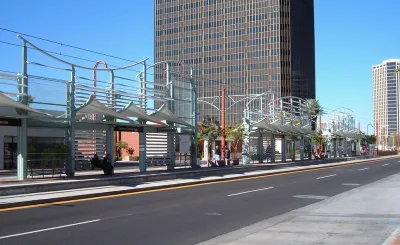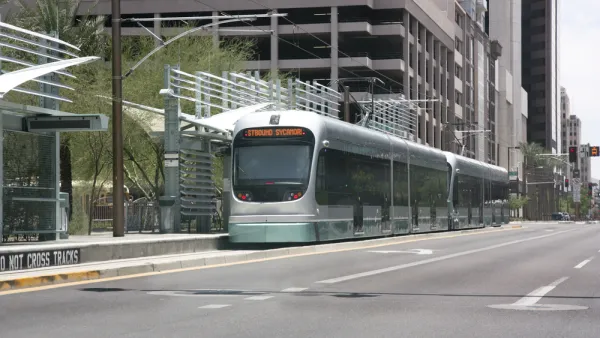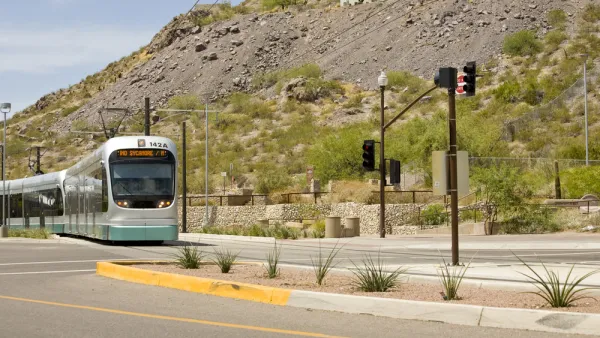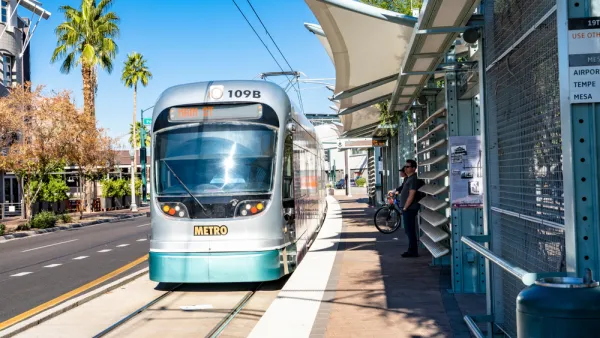Transit advocates are saying the Koch Brothers are responsible for a sudden outbreak of controversy surrounding the South Central Light Rail Extension in Phoenix.

Ahead of a critical vote on a panned light rail extension in Phoenix, Jessica Boehm reports on the financial interests behind the "grassroots" opponents and supporters of a plan to reduce the automobile lanes on Central Avenue to make room for the light rail extension.
Renewed debate over the extension began in March, when a group of south Phoenix business owners asked the council to reconfigure the project to maintain four traffic lanes on Central Avenue. The current plan would reduce the thoroughfare to two lanes.
The Phoenix City Council approved the two-lane plan in 2014 and voters approved funding for the project in 2015. But some south Phoenix residents have said they weren't aware of the lane decrease until this year.
The controversies over the lane reconfiguration has provoked a political action committee called Building a Better Phoenix to begin the process of acquiring signatures "to send back the light rail funding issue to the voters," according to Boehm. The City Council has also discussed shifting some of the funding approved by voters for transit in 2015 to street projects instead. An article by the Associated Press provides more detail about the protests that have raised the light rail plans to the level of controversial in recent months.
"At the same time, a group called Arizonans for Transportation launched a polished website and social media campaign dubbed 'Build South Central' to push back against the anti-light rail messaging," adds Boehm.
Neither organization has revealed the sources of its funding, but Angie Schmitt is willing to press further in assigning credit for Building a Better Phoenix to the Arizona Free Enterprise Institute, which is a "Koch-connected dark-money group," according to a 2o16 article by Laurie Roberts.
FULL STORY: Koch brothers? Valley Metro? Who's paying for pro- and anti-light rail campaigns?

Analysis: Cybertruck Fatality Rate Far Exceeds That of Ford Pinto
The Tesla Cybertruck was recalled seven times last year.

National Parks Layoffs Will Cause Communities to Lose Billions
Thousands of essential park workers were laid off this week, just before the busy spring break season.

Retro-silient?: America’s First “Eco-burb,” The Woodlands Turns 50
A master-planned community north of Houston offers lessons on green infrastructure and resilient design, but falls short of its founder’s lofty affordability and walkability goals.

Test News Post 1
This is a summary

Analysis: Cybertruck Fatality Rate Far Exceeds That of Ford Pinto
The Tesla Cybertruck was recalled seven times last year.

Test News Headline 46
Test for the image on the front page.
Urban Design for Planners 1: Software Tools
This six-course series explores essential urban design concepts using open source software and equips planners with the tools they need to participate fully in the urban design process.
Planning for Universal Design
Learn the tools for implementing Universal Design in planning regulations.
EMC Planning Group, Inc.
Planetizen
Planetizen
Mpact (formerly Rail~Volution)
Great Falls Development Authority, Inc.
HUDs Office of Policy Development and Research
NYU Wagner Graduate School of Public Service




























